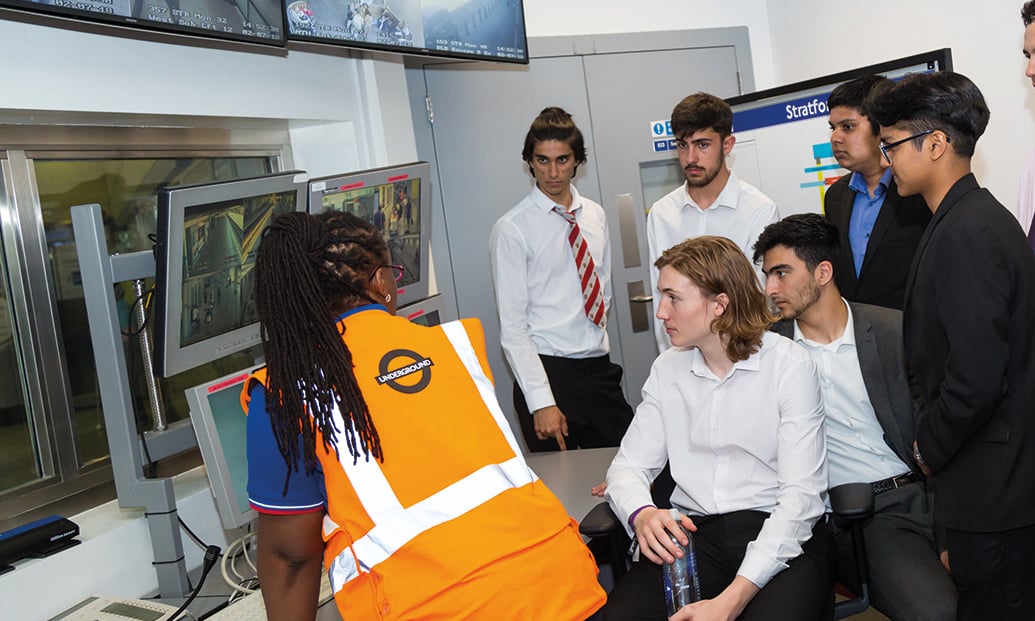To supplement traditional placements, TfL helps simulate work experience within schools with its Innovate Schools Challenge.
Dirty, difficult and male-dominated’: for many young people, perceptions of engineering revolve around men in hard hats doing manual labour for poor pay.
In reality, today’s engineers are creative problem solvers from diverse industries, helping to shape society using the latest science tools
and technology. Starting salaries for UK engineering graduates are well above the all-subject average, while a higher proportion of first-degree engineering and technology graduates are in full-time employment six months after graduation than of graduates overall.
“Engineering is misunderstood,” agrees James Lloyd, resourcing manager school skills at Transport for London (TfL). “There are lots of organisations like ours trying to show the many strands to engineering careers. Some of our future engineers will be digital, sitting behind a desk using virtual reality to construct virtual buildings and systems.”
Access to work experience
Even for a high-profile organisation such as TfL, with a mission to “keep London moving, working and growing”, the UK’s chronic failure to encourage enough young people into STEM careers is taking its toll. Only proactivity will ensure a steady flow of talent into its workforce – and the wider transport sector.
Vocational and graduate routes into work have long been given equal value and emphasis at TfL, which offers 25 apprenticeship schemes across the business. “Within our senior leadership team, you’ll see individuals who originally came in via apprentice schemes and graduate routes,”attests Lloyd.
Meanwhile, three aims underpin TfL’s work with schools around employability: addressing skills scarcity (in STEM, engineering and transport); widening participation among under-represented groups, and supporting social mobility.
Initiatives include a STEM programme delivered at the London Transport Museum; insight sessions at TfL for teachers and students; and the Innovate TfL Schools Challenge in association with Cleshar, an annual competition for students in Years 12 and 13 to win work experience at TfL (plus laptops for their school). While open to all schools, colleges and youth groups, London girls’ schools and schools located in areas of deprivation are specifically targeted.
Under the competition, teams of (four to six) young people are asked to come up with an innovation to a real TfL challenge relating to any element of the Mayor of London’s Transport strategy. This spans the transport network, healthy streets and people, and new jobs and homes “lending itself to a variety of subjects at Years 12 & 13”.
“We want to engage students with an interest in STEM while also appealing to those who have turned away from it,” explains Lloyd.
We want to engage students with an interest in STEM while also appealing to those who have turned
away from it.
Blended learning
The programme is flexible and can be delivered using a blend of guided and independent learning. Lloyd adds that the challenge simulates work experience, benefiting all participants; each team member takes a lead, whether in project management; finance; tech or creativity. He stresses that proactivity is encouraged.
“Our handbook prompts students to take actions: when will they meet next and where? Who will do what? It’s simple things, but teachers are time-poor, so we see this as helping to instil in pupils some of the employability skills that can be difficult to bring into the classroom. Plus, as an employer, we’re bringing ourselves in and showing what we look like as a business.”
An initial launch event is delivered at each school by TfL, which also provides four lesson plans, related resources, plus access to support from ‘TfL innovators’. Students must produce a five-minute filmed presentation about their innovation; a 30-second advert and a design concept.
After shortlisting, the top four teams are supported to re-film their presentation. “It creates quite a buzz in the school,” says Lloyd, “ a buzz that can sometimes be quite hard for teachers to create.”
The teams then attend a final event in March at TfL’s offices, where they are judged by its senior decision makers.
“Ultimately, we’re not looking for the school with the best AV equipment, we’re looking for brave and innovative thinking,” concludes Lloyd.








